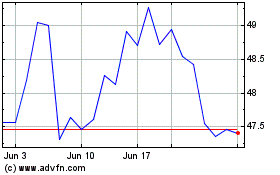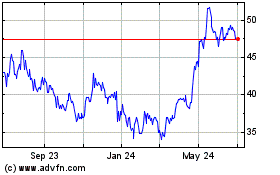Chinese Technology Stocks Have Fallen Harder Than U.S. Peers
March 09 2021 - 6:43AM
Dow Jones News
By Xie Yu and Joanne Chiu
U.S. technology stocks have slipped into correction territory.
Chinese technology stocks have fallen even more.
An index of the largest technology stocks listed in Hong Kong
has dropped 26% in less than three weeks, reflecting how a sudden
turn in the market has snowballed into significant losses for
investors who piled into popular stocks earlier this year.
The Hang Seng Tech Index--which tracks 30 companies including
Chinese internet giants Tencent Holdings Ltd. and Alibaba Group
Holding Ltd., and smartphone maker Xiaomi Corp.--closed Tuesday at
its lowest level in 2021 and is now in bear-market territory,
defined as a drop of at least 20% from a recent high.
In comparison, the Nasdaq Composite closed on Monday 10.5% lower
than the index's recent high on Feb. 12.
Money managers say the trigger for the U.S. and Asia market
declines was similar: a fast and unexpected rise in Treasury bond
yields, which made stocks of fast-growing companies less attractive
and caused some investors to shift from technology into banking,
energy and other less volatile stocks. China's big technology
players have taken a bigger hit, because a flood of money from
investors in mainland China had pushed up their stock prices and
valuations sharply.
"It's hard to call the bottom, but we see this as a healthy
correction, and the market was due for one," said Nicholas Yeo, who
oversees China equities at Aberdeen Standard Investments in Hong
Kong. He said the long-term growth outlook for the country's
internet and technology giants remains intact but that their stocks
are vulnerable to big swings because they were among the main
beneficiaries of excess liquidity in the markets during the
coronavirus pandemic.
Barely a month ago, Meituan, a Beijing-based company that runs a
popular shopping, food-delivery and bookings app, was flying high
as China's third most valuable company, with a market
capitalization in excess of $300 billion. Investor enthusiasm over
Meituan's recent expansion into grocery bulk-buying in China caused
a rapid run-up in its shares, even though the company generates
only a small profit.
Meituan has been one of the biggest casualties of the recent
selloff, which has cut its value by a third since Feb. 17. The
stock was one of the most popular purchases by investors in
mainland China using the Stock Connect trading link to buy stocks
listed in Hong Kong. Outflows through that link have recently
picked up.
Armies of individual investors who have become more active users
of mobile trading apps have also been driving up market
volumes.
As a result, "When things start to go up, they go up very
quickly. But when they start to go down, the whole thing unravels
quickly, too," said Wei Wei Chua, a portfolio manager at Mirae
Asset Global Investments in Hong Kong. He said his firm has rotated
into cyclical financial names, such as insurers, and defensive
plays, such as utility companies.
Ken Peng, head of Asia-Pacific investment strategy at Citi
Private Bank, said that as the world gradually recovers from the
coronavirus pandemic, technology stocks could fall out of favor
with investors. "There's going to be less demand for tech," he
said, "and more demand for leaving your house."
Many individual investors suffered losses in the swift selloff.
Huang Xiaohu, a 35-year-old technology entrepreneur in Shenzhen,
earlier on profited from the strong trading debut of Kuaishou
Technology, an operator of a popular short video app in China.
After selling shares he received in the company's initial public
offering, he decided to buy them back following a recent tumble,
but the shares kept falling, and he is sitting on paper losses
equivalent to more than $10,000.
"I don't want to talk about stocks anymore. My heart is broken,"
said Mr. Huang, who also holds the Hong Kong-listed shares of
Alibaba, with a paper loss of around 20%. He said he plans to keep
both stocks in the hope of a recovery.
Write to Xie Yu at Yu.Xie@wsj.com and Joanne Chiu at
joanne.chiu@wsj.com
(END) Dow Jones Newswires
March 09, 2021 06:28 ET (11:28 GMT)
Copyright (c) 2021 Dow Jones & Company, Inc.
Tencent (PK) (USOTC:TCEHY)
Historical Stock Chart
From Mar 2024 to Apr 2024

Tencent (PK) (USOTC:TCEHY)
Historical Stock Chart
From Apr 2023 to Apr 2024
